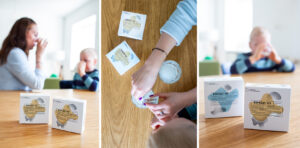Katar alergiczny – objawy, rozpoznanie, leczenie
Spis treści:
Czym jest katar alergiczny?
Katar alergiczny, znany także jako alergiczny nieżyt nosa, jest stanem zapalnym błony śluzowej nosa wywołanym przez reakcję immunologiczną na alergeny występujące w środowisku. Jest to jedna z najczęstszych form alergii, która manifestuje się przez szereg objawów, takich jak kichanie, zatkany nos, wodnisty wyciek z nosa, pieczenie oraz swędzenie oczu. Katar alergiczny można podzielić na sezonowy i całoroczny, w zależności od tego, czy alergeny, które wywołują objawy, występują przez cały rok, jak np. roztocza kurzu domowego, czy mają charakter sezonowy, jak pyłki roślin.
Chociaż objawy kataru alergicznego mogą przypominać przeziębienie, są to dwa zupełnie różne stany zdrowotne. Przeziębienie wywołane jest przez wirusy i zazwyczaj trwa od kilku dni do tygodnia. Objawy takie jak gorączka, bóle mięśni, czy ogólne złe samopoczucie, które często towarzyszą przeziębieniu, zwykle nie występują w przypadku kataru alergicznego. Ponadto katar alergiczny charakteryzuje się dłuższym lub nawet przewlekłym przebiegiem.
Rozróżnienie między tymi dwoma stanami jest kluczowe dla skutecznego leczenia. Podczas gdy przeziębienie zwykle mija samoistnie bez potrzeby leczenia, katar alergiczny wymaga często zastosowania specyficznych leków antyalergicznych oraz środków zaradczych, które mają na celu zmniejszenie lub eliminację kontaktu z alergenami.
Przyczyny wystąpienia kataru alergicznego
Katar alergiczny jest spowodowany przez nadreaktywność układu immunologicznego na substancje, które w normalnych warunkach są nieszkodliwe. Do najczęstszych alergenów, które mogą prowokować objawy kataru alergicznego, należą:
- pyłki roślin – jedne z najbardziej rozpowszechnionych alergenów, zwłaszcza w okresach kwitnienia traw, drzew i chwastów. Pyłki te są przenoszone przez wiatr i mogą dostawać się do dróg oddechowych, wywołując reakcje alergiczne,
- roztocza kurzu domowego – mikroskopijne organizmy żyjące w kurzu domowym, zwłaszcza w pościeli, dywanach, tapicerowanych meblach i innych miejscach gromadzenia się kurzu,
- sierść zwierząt – alergeny pochodzące od zwierząt domowych, takich jak psy i koty, obejmują nie tylko sierść, ale również łupież, ślinę i mocz,
- pleśnie – grzyby, które rosną w wilgotnych, ciepłych miejscach, wewnątrz i na zewnątrz domów.
Środowisko, w jakim żyjemy, ma znaczący wpływ na rozwój alergii, w tym kataru alergicznego. Czynniki takie jak zanieczyszczenie powietrza, obecność alergenów w miejscu zamieszkania, a także zmiany klimatyczne, które wpływają na długość sezonów alergicznych i intensywność produkcji pyłków, mogą znacznie zwiększać ryzyko wystąpienia objawów alergicznych. Na przykład obszary miejskie z wysokim poziomem smogu często odnotowują większą liczbę przypadków alergii, co jest związane z podrażniającym działaniem zanieczyszczeń na drogi oddechowe, co z kolei może nasilać reakcje alergiczne.
Diagnostyka – jak rozpoznać katar alergiczny?
Diagnoza kataru alergicznego opiera się głównie na dokładnym wywiadzie medycznym oraz badaniach specjalistycznych, które pomagają zidentyfikować alergeny odpowiedzialne za wywołanie objawów. Poniżej wymienione są najczęściej stosowane metody diagnostyczne:
- Wywiad lekarski – lekarz pyta o charakterystykę i czas trwania objawów, a także o występowanie podobnych przypadków w rodzinie, co może sugerować genetyczne skłonności do alergii.
- Testy skórne – to jedna z najczęstszych metod diagnostycznych w alergologii. Polega na aplikacji na skórze małej ilości różnych alergenów i obserwacji reakcji skórnej. Pojawienie się zaczerwienienia lub bąbla w miejscu narażenia na alergen wskazuje na alergię.
- Testy z krwi – analiza poziomu specyficznych przeciwciał IgE w surowicy krwi może również pomóc w identyfikacji alergenów. Testy te są szczególnie pomocne, gdy testy skórne nie mogą być przeprowadzone, na przykład przy stosowaniu niektórych leków lub w przypadku ciężkich chorób skóry.
Konsultacja z lekarzem jest wskazana, gdy objawy kataru alergicznego stają się uciążliwe, przewlekłe lub znacząco wpływają na jakość życia. Warto zasięgnąć porady medycznej w przypadkach, kiedy:
- objawy nie ustępują pomimo stosowania ogólnodostępnych leków przeciwalergicznych,
- objawy są na tyle intensywne, że zakłócają codzienne funkcjonowanie, sen lub wydajność w pracy,
- pojawiają się dodatkowe objawy, takie jak trudności w oddychaniu, świszczący oddech, który może sugerować rozwój astmy alergicznej,
- istnieje potrzeba dokładnego zidentyfikowania alergenów w celu ich uniknięcia lub rozpoczęcia odpowiedniego leczenia, takiego jak immunoterapia.
Leczenie i profilaktyka kataru alergicznego
Leczenie kataru alergicznego może przyjąć różne formy, w zależności od nasilenia i rodzaju objawów, jak również od indywidualnych preferencji pacjenta. Do najczęściej stosowanych metod należą:
1. Leczenie farmakologiczne:
- antyhistaminiki – leki te blokują działanie histaminy, substancji chemicznej odpowiedzialnej za większość objawów alergicznego nieżytu nosa. Dostępne są w formie tabletek, kropli do nosa czy sprayów,
- kortykosteroidy donosowe – stosowane w celu zmniejszenia stanu zapalnego w błonach śluzowych nosa. Są uznawane za jedne z najskuteczniejszych środków w kontrolowaniu ciężkich objawów,
- stabilizatory mastocytów – pomagają zapobiegać uwolnieniu mediatorów alergii z komórek tucznych, co może być pomocne szczególnie w prewencji objawów.
2. Metody naturalne:
- płukanie nosa solą fizjologiczną – regularne płukanie nosa roztworem soli może pomóc w usunięciu alergenów i śluzu, łagodząc objawy,
- herbatki ziołowe – niektóre zioła, jak np. pokrzywa, mogą wspierać naturalne mechanizmy obronne organizmu i łagodzić objawy alergii,
- zmiany w diecie – dodanie do diety więcej antyoksydantów i naturalnych przeciwzapalnych składników może wspomagać organizm w walce z alergiami.
Rozpoczęcie działań profilaktycznych i odpowiednie leczenie po pierwszych sygnałach alergii może znacząco obniżyć częstotliwość oraz intensywność objawów, co pozwala na poprawę jakości życia osób cierpiących na alergiczny nieżyt nosa. Regularne wizyty u specjalisty i dostosowywanie planu leczenia do zmieniających się warunków pogodowych oraz reakcji organizmu są również istotnym elementem skutecznego leczenia alergii.
Katar alergiczny u dzieci - co warto wiedzieć?
Katar alergiczny u dzieci może mieć nieco inne objawy niż u dorosłych, a jego rozpoznanie bywa czasami trudne ze względu na podobieństwo do typowych infekcji wieku dziecięcego. Objawy kataru alergicznego u dzieci często obejmują:
- ciągłe kichanie – zwłaszcza w serii, często po wystawieniu na działanie alergenu,
- przezroczysty, wodnisty wyciek z nosa – inaczej niż przy infekcjach, gdzie wydzielina często jest gęsta i ma kolor zielony lub żółty,
- świąd nosa, oczu, uszu lub gardła – dzieci mogą często pocierać nos lub oczy,
- zatkany nos – może prowadzić do problemów z oddychaniem przez nos, co zmusza dziecko do oddychania przez usta,
- zmęczenie i drażliwość – wynikające z zakłóceń snu spowodowanych trudnościami w oddychaniu.
Jeśli podejrzewasz, że twoje dziecko może cierpieć na katar alergiczny, ważne jest, aby skonsultować się z pediatrą lub alergologiem. Wczesna diagnoza i rozpoczęcie leczenia mogą znacznie poprawić komfort życia dziecka. O ile to możliwe, staraj się eliminować lub ograniczać kontakt dziecka ze zidentyfikowanymi alergenami. Może to oznaczać utrzymanie czystości w domu, aby zminimalizować obecność roztoczy kurzu domowego, oraz ograniczenie czasu spędzanego na zewnątrz podczas wysokiego stężenia pyłków. Co ważne, leki przeciwhistaminowe i inne preparaty przeciwalergiczne mogą być bezpiecznie stosowane u dzieci, ale zawsze powinny być podawane zgodnie z zaleceniami lekarza. Nigdy nie stosuj leków dla dorosłych bez konsultacji z pediatrą.

Życie z katarem alergicznym – porady i rekomendacje
Życie z katarem alergicznym wymaga odpowiednich strategii, które mogą skutecznie poprawić nasze funkcjonowanie. Zaleca się regularne sprzątanie domu w celu redukcji alergenów. Użycie odkurzacza z filtrem HEPA, częste pranie pościeli i zasłon, a także unikanie dywanów i tapicerek zbierających kurz, to podstawowe środki zaradcze. Wprowadzenie oczyszczaczy powietrza oraz stosowanie filtrów do systemów grzewczych/wentylacyjnych może również zmniejszyć ilość alergenów w powietrzu. Ponadto, ograniczenie ekspozycji na zewnątrz w okresach wysokiego stężenia pyłków, a także noszenie okularów przeciwsłonecznych i masek może ograniczyć kontakt z alergenami.
Zarządzanie stresem jest również istotne, ponieważ może on nasilać objawy alergii. Praktykowanie technik relaksacyjnych, takich jak medytacja, joga, regularne ćwiczenia fizyczne czy angażowanie się w hobby, może pomóc w redukcji stresu.
Dieta i styl życia mają znaczący wpływ na objawy alergii. Zaleca się spożywanie żywności bogatej w antyoksydanty, takiej jak warzywa, owoce, orzechy i pełnoziarniste produkty, które mogą wspierać układ odpornościowy i zmniejszać stan zapalny. Spożywanie kwasów tłuszczowych omega-3 i innych zdrowych tłuszczów (np. z ryb, awokado, oliwy z oliwek) również może przyczynić się do łagodzenia symptomów alergii.
Dzięki holistycznemu podejściu, które obejmuje zarówno zmiany w środowisku, jak i modyfikacje stylu życia i diety, można znacząco poprawić samopoczucie i funkcjonowanie osób zmagających się z katarem alergicznym.
Bibliografia:
- Emeryk A., Rapiejko P., Alergiczny nieżyt nosa, Lekarz POZ 2/2019, s. 165-169.
- Gajewski P., Szczeklik A., Interna Szczeklika 2019, Medycyna Praktyczna 2019; rozdz. 8, str. 1906-1910.
- Sadowska D., Katar jesienny czy alergia? Jak nie przeoczyć pierwszych objawów, Lekarz POZ, 4/2020, s. 221-224.










































